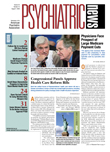APA has hailed an agreement by drug companies and the Obama administration to discount by 50 percent the cost of pharmaceuticals that fall within Medicare's drug coverage gap.
The voluntary agreement by pharmaceutical companies, announced in June, will cut the cost of name-brand prescription medications by up to 50 percent when they fall into the so-called donut hole of Medicare's Part D prescription drug program that excludes coverage of drugs when their annual costs rise to between $2,700 and $6,154. Drug costs are reimbursed at 75 percent when they are less than $2,700 annually, and Medicare covers 100 percent of the cost of drugs once their accumulated cost rises above $6,154 annually.
The agreement is predicted to provide up to $30 billion in discounts to seniors and save the federal government an additional $50 billion over 10 years in health care costs. Obama administration officials have not specified how these savings will occur.
APA President Alan Schatzberg, M.D., hailed the development, calling the coverage gap “an excessive burden to those over 65 and those who are chronically disabled, including those suffering from mental illnesses.”
“Although this is a first step, it is a step in the direction of providing high-quality, affordable health care to all Americans,” Schatzberg said. “APA recognizes that full prescription coverage is an integral part of any meaningful health care reform and applauds the effort to eliminate one of the most glaring deficiencies in Medicare.”
The Obama administration described the agreement as part of the effort to enact major health care reform under consideration in Congress, because the details of the $50 billion projected savings in the agreement will be negotiated as part of final health care reform legislation. The deal is the latest high-profile voluntary agreement that the administration has announced with entities involved in the health care sector. The White House also has reached agreements for health care providers and hospitals to provide billions in savings to Medicare over the next 10 years, according to administration announcements. However, few details have been released on how those savings will be achieved, and some congressional leaders have said they will not honor the agreements in formulating health care reform measures.
“The agreement by pharmaceutical companies to contribute to the health reform effort comes on the heels of the landmark pledge many health-industry leaders made to me last month, when they offered to do their part to reduce health spending $2 trillion over the next decade,” Obama said in a written statement issued in June.
Those deals are important because the high cost of expanding insurance coverage to the nation's 47 million uninsured—estimated between $1 trillion and $2 trillion over 10 years—has slowed the pace of legislation in Congress to overhaul health care. Public-opinion polls also have consistently found that although most people support health reform, support is weak for any specific funding proposal.
The impact of the latest agreement on people with serious mental illness could be significant.
Roughly 3.5 million Medicare beneficiaries are projected to fall into the donut hole this year, according to congressional health reform advocates. According to a 2008 Kaiser Foundation study, about 500,000 Medicare beneficiaries—or 15 percent—stopped using their prescription drugs when they fell into the prescription costs range that comprises the donut hole. The study examined some beneficiaries with chronic illnesses, including people receiving treatment for depression, and found that 15 percent who were prescribed antidepressants stopped taking the medication when they reached the coverage gap in 2007. Another 8 percent stopped taking Alzheimer's medications when they reached the gap.
Anita Everett, M.D., chair of APA's Council on Healthcare Systems and Financing, said the planned assistance would have a “tremendous impact” on fixed-income Medicare patients with mental illness.
“Many individuals with mental illness depend on Medicare for access to psychiatric and other medications; the donut hole payment makes medications unaffordable to many who choose to go without rather than to pay hundreds of dollars each month for medications,” said Everett, in comments to Psychiatric News.
Meanwhile, the pharmaceutical drug discount agreement drew some criticism from consumer advocates and liberal politicians, who said the total $80 billion in drug company price cuts are a tiny fraction of the $3.3 trillion in prescription drug spending that the Department of Health and Human Services estimates will occur over the next 10 years.
